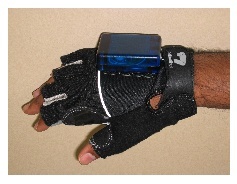
I just posted pictures from the wearable-technology fashion show that was part of the ISWC 2005 program, sponsored by the KANSAI IT Synergistic Society. This was the third ISWC to include such a show, the first being Beauty and the Bits hosted by the MIT Media Lab at the first ISWC, and the second hosted by Komposite at ISWC 2002 in Seattle.
There were a few practical application garments being shown at this show, but most leaned towards the fashion end, with dance, music and LEDs playing prominent roles. My apologies for the quality of some of the pictures — my little hand-held camera doesn’t work well in low lighting.



